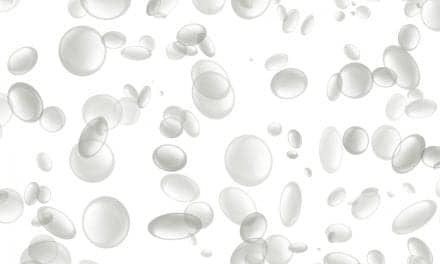NJMRC is dedicated to meeting individual patients’ needs through education and disease management programs,
Health care professionals at the National Jewish Medical and Research Center, Denver, are getting used to success. For the past 2 years in a row, US News & World Report has ranked National Jewish (NJ) as the top hospital for treating respiratory disorders—just ahead of the Mayo Clinic in Rochester, Minn.
“The major focus at National Jewish is patient education,” says Noreen Nicol, director of nursing. “One of the primary reasons our outcomes are so good is that the entire team takes time to educate patients about their disease and how to use their medication. It’s not that we use different medications than the rest of the world, it’s just that we have a different way of teaching people how to use them.”
NJ’s patient treatment program encourages the entire team to be generous with its time. “We probably spend more time per average appointment than any institution in the country,” Nicol says. “Our initial appointments with patients still range from 1 hour to 11/2 hours with the physician and the nurse together. That’s just the initial encounter—then there’s intense follow-up by nurses and the whole multidisciplinary team.”
More than half of NJ’s patients come from outside the state of Colorado. They seek the comprehensive self-management programs that form the cornerstone of NJ’s patient treatment strategy. For example, the NJ staff developed a series of patient teaching booklets for adults that explains the hospital’s health initiatives. Pediatric patients can opt for the “Wizard” coloring book program designed to educate children about asthma. NJ develops all materials from within, using its own nationally and internationally recognized staff. Donations from pharmaceutical companies help underwrite publication costs.
Time is Money
Despite the proven benefits of time and education, these intangibles are not reimbursed by Medicare or managed care. “The only correlation is the kind of comprehensive program that’s recognized in diabetes education, where diabetes educators are actually reimbursed because it’s such an integral part of care,” Nicol says. “We haven’t made that stride yet in asthma, although there are professional organizations working toward that goal.
“Despite the fact that there’s no way to get paid for it, we do it [education] and most of it’s for free,” she adds. NJ also provides information through a comprehensive group education class structure for both children and adults for all respiratory diseases. Asthma and chronic obstructive pulmonary disease (COPD) classes are taught separately. A large one-on-one teaching program is also available and backed up with Med Facts, a free service on NJ’s Web site at www.nationaljewish.org.
“Education doesn’t necessarily save the institution money, but it saves on patients’ costs in the long run,” Nicol says.
Thanks to a well-developed fund-raising network, time and materials are given freely. “The generosity of individuals and foundations allows us to be generous with our time and resources,” Nicol says. “That’s what’s kept me here for 15 years.”
In fact, charging for medical care is relatively new at National Jewish. Until 1967, contributions covered virtually all patient costs. The motto in those days was “None may enter who can pay; None can pay who enter.” While it is no longer possible to offer exclusively free medical treatment, NJ continues to spend $7 to $10 million annually on free or heavily subsidized care—about 15% of the annual operating budget. Twenty percent to 25% of the total annual operating budget of about $85 million is supported by philanthropy.
To maintain this commitment to free care, NJ began a $52 million Centennial Campaign—the largest fund-raising initiative in the history of the institution. By late 1998, it had nearly $25 million in gifts from trustees, directors, and long-time supporters. Additional contributions from individuals, corporations, and foundations are being sought nationwide.
Disease Management
NJ’s disease management program for asthma shapes clinical protocols nationwide by contracting with health plans thoughout the country. While most disease management patients may never actually visit NJ, they benefit from NJ’s nationally recognized expertise. Each patient in the program is a member of an HMO that contracts with NJ.
Through specialized surveys administered via telephone, clinicians at NJ stratify patients according to risk. “We ask questions on utilization, symptoms, psychosocial risks such as smoking, self-monitoring, frequency of medication use, and whether they, in fact, have an asthma action plan and the correct medications,” says Abby Schwartz, NJ’s director of disease management. “We have a unique program for patients with mild asthma, and a more intensive program for patients with moderate or severe asthma.”
| National Jewish Medical and Research Center • National Jewish is a 12-building, 500,000-square-foot facility on 14 acres, just a few miles east of downtown Denver. • For the past 2 years in a row, US News & World Report has ranked National Jewish (NJ) as the top hospital for treating respiratory disorders. • NJ is the only medical and research center in the United States devoted entirely to respiratory, allergic, and immune system diseases. • The average length of years of nursing at NJ is 10.9 years. |
NJ partners with primary care physicians to develop action plans that patients can use when they start to become symptomatic. The plans are reinforced by disease management nurses who work with asthmatic patients. Patients can call NJ’s 24-hour phone line when they become symptomatic.
“The asthma care management nurses are very skilled at working a patient through an asthma episode,” Schwartz says. “The nurses are also excellent at encouraging patients to be adherent by setting contracts and partnering with patients to adhere to peak flow monitoring or comply with telemetric pulmonary monitoring.
“We have a physician-centered program where we bring physicians in from the very beginning,” Schwartz continues. “When we implement a program in a state outside of Colorado, we work with the physicians in that community as part of the implementation process….Our medical director is constantly talking with physicians.”
About 3,400 patients are currently enrolled in the asthma program. According to Schwartz, utilization data for 1,448 patients show that in the past 6 months NJ has been able to decrease hospitalizations by 50%, emergency department visits by 59%, and asthma-related ICU admissions by 54%. Days missed from work went down 55% and, for children, days missed from school dropped 39%. Unscheduled physician office visits were reduced by 59%.
In addition to asthma, NJ is one of the only institutions in the country that offers COPD disease management. Schwartz says that COPD outcomes show improvement in utilization and quality of life.
Another key to NJ’s success lies in the experience of its nurses. “Of the 100 employees who report to me, our average length of years of nursing at NJ is 10.9 years,” Nicol says, “That’s just at NJ and doesn’t include total years in the field.” Despite the nursing shortage in most hospitals, where there are 50-100 openings on any given day, NJ rarely has more than one or two openings that do not take much time to fill.
“We have a large group of nurses [with both BS and MS degrees] who actually specialize and have multiple years of experience in all the diseases that we treat here,” Nicol says. “We haven’t cut the kind of staffing corners in our nursing and medical staff, or our ancillary services, that many other institutions have been forced to do.”
NJ nurses answer thousands of questions each year on the toll-free Lung Line® (800) 222-LUNG and Lung Facts™ (800) 552-LUNG. “Anyone can call to see if it would be appropriate for them to access care at National Jewish,” says Verne Singleton, NJ’s chief administrative officer. “Lung Line can be the front door or just a line for general public information.”
A Rich Tradition
National Jewish began 100 years ago as the National Jewish Hospital for Consumptives. It started as a nonprofit, private, independent, nonsectarian patient care institution entirely devoted to treating tuberculosis (TB). Twenty years after opening its doors, NJ began intensive research efforts that helped curb TB.
Today, National Jewish is a 12-building, 500,000-square-foot facility on 14 acres, just a few miles east of downtown Denver. Research now takes 40% to 50% of the operating budget and has expanded to include other chronic lung diseases, as well as allergies and immune system disorders. Most research is funded by government agencies—primarily the National Institutes of Health.
After merging with the National Asthma Center more than 20 years ago, NJ became one of the top 10 independent biomedical research centers of any kind in the world, and the only facility that also provides patient care.
NJ is primarily an outpatient facility, and it is the only medical and research center in the United States devoted entirely to respiratory, allergic, and immune system diseases. This kind of focus helped NJ garner a reputational score of 51.4% in US News and World Report. That means more than half of the randomly selected board-certified specialists named NJ as the finest institution in the country for respiratory disorders.
“The major teaching facilities have a much broader base of clinical programs,” Singleton says. “Disease specialties are not a sideline here. They are the core of what we do.”
Greg Thompson is an associate editor for RT Magazine.









